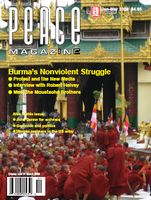
Peace Magazine Jan-Mar 2008, page 25. Some rights reserved.
Search for other articles by Chris Wright here
...No man is an island, entire of itself; every man is a piece of the continent, a part of the main. If a clod be washed away by the sea, Europe is the less, as well as if a promontory were, as well as if a manor of thy friend's or of thine own were: any man's death diminishes me, because I am involved in mankind, and therefore never send to know for whom the bell tolls; it tolls for thee.
This passage, from John Donne's 17th Meditation, is one of the most famous in all literature. Virtually everyone is familiar with its conclusion, commonly paraphrased as "ask not for whom the bell tolls; it tolls for thee." Everyone recognizes that it expresses a noble sentiment, though few give it literal significance. After all, how could another man's death really "diminish" me? In what sense could his misfortune be mine too? But if we understand what Donne meant, maybe we'll recognize its moral implications.
Donne invoked God, but that isn't necessary. In any case, God is dead. (He was killed in the French Revolution.) The meaning of the passage is that what happens to other people affects the value of my own life. Indeed, other people are me, in some sense. They are self-conscious like me, they inhabit the same world I do. What happens to them could have happened to me, and sometimes inevitably will happen to me. Their mortality is my mortality, because our essence is the same. They are me transposed in space and time, me in a different consciousness and set of circumstances.
When something terrible happens to another person and his life is ruined, human life itself loses value. For in a world of injustice, in which destinies are determined by chance, life cannot have the value we privileged ones ascribe to it. The dictates of reason are irrelevant to it and truth is violated by it. When I read in the paper that the family of an innocent Lebanese man has been killed by an Israeli bomb I recognize in his despair the cosmic littleness of my own life--the irrelevance of such notions as reason, truth, freedom, morality, necessity, justice. If I happen to live well and be happy that's only by chance, for I could have been that man. But, knowing this, how can I be truly happy? How can I be convinced of the value of my life, knowing that life itself is the sort of thing that doesn't have value?
What I'm describing is absurdity, in the existentialist sense. Life is absurd in a world of violence and coercion. A radical disjunct is manifested between what we, as human beings, demand of life and what is delivered. Absurdity is that disjunct. It means we are alienated from life, we cannot identify with it or glory in it wholeheartedly, because it is a stranger to the human way of thinking, the beautiful way of thinking. An absurd life is scarcely worth living. Consider a man who is buffeted by forces beyond his control, who is compelled to adopt unfulfilling life-paths, who is beaten into conformity. It would seem that his life is not valuable. That man is Everyman. We all remain subject to chance, to coercive social mechanisms, and the possibility is always real that our peace of mind will be shattered in an instant.
That Lebanese man's situation reminds us that we are not masters of our fate but are instead blown like willow-down in the wind of societal forces. Our leaders are in much the same position as we. When we question whether life is to remain a tragic farce or draw closer to what is good, we can't rely on our leaders. We have to act ourselves to push the world towards sanity. Indeed, this activism is a moral imperative. It is not an option but an absolutely necessity. Without such activism life will continue being the valueless, contingent, coerced thing it seems now to be.
Only if we create a stable and just world, a place not ruled by radical contingency, will life cease to be absurd. Perhaps you'll say that such a world cannot be achieved, that it's a ridiculous utopian fantasy. And you may be right. In the meantime, though, whenever you read the front page of the newspaper, you'll hear the bell tolling--for you.
Chris Wright is a graduate student of history in Boston.

Peace Magazine Jan-Mar 2008, page 25. Some rights reserved.
Search for other articles by Chris Wright here